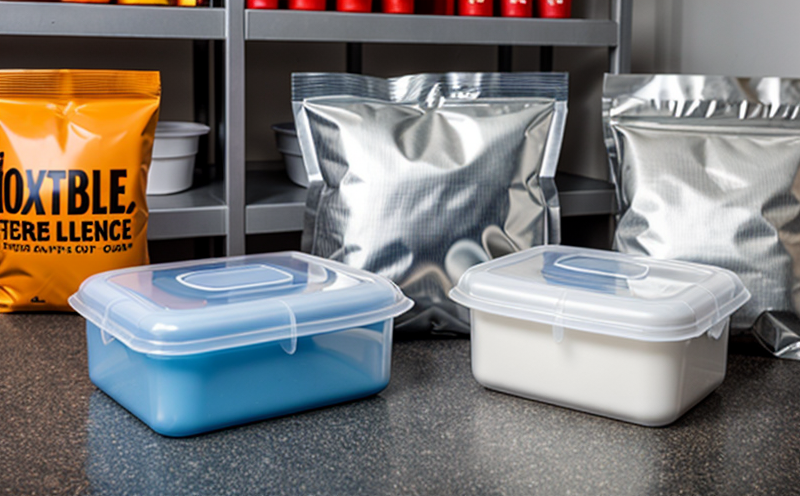ISO 22007-1 Thermal Analysis of Film Properties
The ISO 22007-1 standard provides a comprehensive framework for the thermal analysis of film properties, which is crucial in the packaging industry. This method ensures that flexible packaging materials meet stringent quality and safety standards. Understanding the thermal behavior of films allows manufacturers to optimize material performance, enhance product integrity, and ensure compliance with regulatory requirements.
The process involves subjecting film samples to controlled heating and cooling cycles while measuring physical properties such as heat capacity, glass transition temperature (Tg), melting point (Tm), and crystallinity. These parameters are essential for predicting the behavior of packaging materials under various environmental conditions, which is particularly important in sectors like food packaging where shelf life and safety are paramount.
Flexible packaging films used in this analysis often include polymers like polyethylene (PE) and polypropylene (PP), as well as multi-layer composites with barrier layers. The thermal properties of these materials can significantly impact the performance of the final product, influencing factors such as oxygen permeability and moisture resistance.
During testing, specimens are carefully prepared to ensure accurate results. This typically involves cutting standardized samples from larger rolls or sheets, ensuring uniform thickness, and avoiding defects that could skew test data. The testing apparatus used in this process adheres strictly to ISO 22007-1 guidelines, providing precise and reliable thermal analysis.
The significance of this service extends beyond mere compliance with standards; it plays a vital role in product development and quality assurance. By identifying optimal processing temperatures and conditions during manufacturing, companies can enhance the durability and performance of their packaging solutions. This not only improves customer satisfaction but also reduces waste and operational costs associated with suboptimal materials.
Furthermore, thermal analysis is instrumental in ensuring that flexible packaging meets stringent hygiene and safety standards. In sectors like food and pharmaceuticals, where contamination risks are high, understanding the thermal stability of materials ensures that products remain safe from harmful microorganisms during storage and distribution.
The process also aids in optimizing supply chain logistics by providing insights into how packaging will behave under different temperature conditions encountered throughout transportation and warehousing. This knowledge helps prevent potential issues such as premature degradation or failure due to excessive heat or cold, thereby enhancing overall product quality and customer trust.
Industry Applications
The ISO 22007-1 thermal analysis of film properties finds extensive application across various industries that rely heavily on flexible packaging. These include food processing, pharmaceuticals, cosmetics, and medical devices, among others.
- Food Processing: Ensuring the integrity of food packaging films is critical to maintaining product quality and safety throughout storage and distribution.
- Pharmaceuticals: The thermal stability of drug packaging materials must be assessed to prevent degradation of active ingredients under adverse conditions.
- Cosmetics: Packaging for cosmetic products needs to withstand varying environmental temperatures without compromising the product's integrity or appearance.
- Medical Devices: High-quality, reliable packaging is essential in this sector to protect sensitive devices and ensure they meet strict regulatory requirements.
In each of these industries, accurate thermal analysis helps manufacturers make informed decisions about material selection and processing conditions. This ensures that the final product not only meets but exceeds industry expectations for safety, performance, and reliability.
Eurolab Advantages
Eurolab stands out as a premier provider of ISO 22007-1 thermal analysis services for film properties due to its commitment to excellence in testing and quality assurance. Our state-of-the-art facilities and experienced technical staff ensure that every test is conducted with precision and accuracy.
- Accurate Testing: Eurolab's equipment adheres strictly to ISO 22007-1 standards, guaranteeing reliable results.
- Expertise: Our team of qualified professionals brings extensive experience in flexible packaging testing, ensuring comprehensive understanding and application of relevant standards.
- Precision Instruments: We utilize high-quality analytical instruments to capture detailed data points that contribute to precise thermal analysis.
- Rapid Turnaround: Eurolab prides itself on providing timely reports, enabling clients to swiftly incorporate test results into their product development processes.
In addition to these technical advantages, Eurolab offers a supportive environment for collaboration between clients and our experts. This approach fosters deeper understanding of testing requirements and ensures that all needs are met efficiently and effectively.
Quality and Reliability Assurance
The importance of quality and reliability assurance in flexible packaging cannot be overstated, especially when dealing with sensitive products like food or pharmaceuticals. Accurate thermal analysis plays a key role in ensuring that packaging materials meet stringent standards regarding heat resistance, oxygen permeability, and microbial safety.
- Heat Resistance: Packaging films must withstand high temperatures without degrading, which is critical for maintaining product integrity during storage and transportation.
- Oxygen Permeability: Effective barrier properties are essential to prevent oxidation of sensitive products, ensuring their freshness over extended periods.
- Microbial Safety: Packaging materials should be designed to inhibit microbial growth, thereby preserving the safety and quality of contained goods.
By leveraging ISO 22007-1 thermal analysis, manufacturers can ensure that their packaging meets these critical requirements. This not only enhances product performance but also contributes significantly to maintaining consumer trust and satisfaction.





